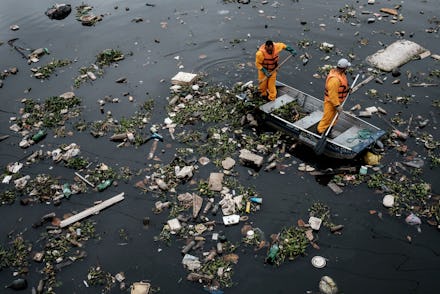Brazil Couldn't Fix Its Water Pollution Problem in Time for the 2016 Rio Olympics

As past Olympics hosts like Russia and China have learned, hosting the games comes with a plethora of potential problems. With the 2016 Summer Olympic Games in Rio de Janeiro fast approaching, Brazil is now facing a number of pressing challenges — among them, the issue of contaminated water.
Water pollution has been plaguing Brazil for decades. Rio de Janeiro only treats a small percentage of its sewage, resulting in water teaming with sludge and discarded trash, according to the Guardian. As Fusion put it, these Olympics could be the "shittiest" ever — literally.
"Olympic athletes are almost certain to come into contact with disease-causing viruses that in some tests measured up to 1.7 million times the level of what would be considered hazardous on a Southern California beach," the Associated Press reported.
The backstory: Rio originally acknowledged its sewage problem, and actually used it in its pitch to win the Olympic bidding in 2009. The direct, flattering appeal to the International Olympic Committee was this: "Bestow the transformative power of your three-week event on our city," according to ESPN. "We need the games more than Chicago does, more than Madrid."
Brazilian officials vowed to cut pollution by 80% in the infamously filthy Guanabara Bay — but in January, admitted they couldn't make it happen, according to Fusion. Between 80 tons and 100 tons of garbage reportedly gets washed into Guanabara Bay each day.
Officials have said they've worked to clean up the water conditions, particularly in the racing areas. But because of the widespread scope of the problem, they've only been able to clear a fraction of the debris, Business Insider reported.
"There's not much we can do about it, other than take precautions and mentally prepare for anything that might come up," U.S. men's rowing head coach Bryan Volpenhein told Business Insider. "You just go out and race and hopefully you row clean enough that you're not getting splashed."
While no athletes have pulled out of the games because of the pollution (several have declined their invitation because of the Zika virus), visiting countries are preparing their athletes to avoid the local water supply, according to the Star Tribune. Brazilian officials have also reportedly set strict anti-contamination routines for athletes in open-water sports.
Unfortunately for Brazil, water pollution isn't the country's only challenge leading up to the Olympics. The host country is also contending with the outbreak of Zika, a major economic recession and political instability.
Read more: